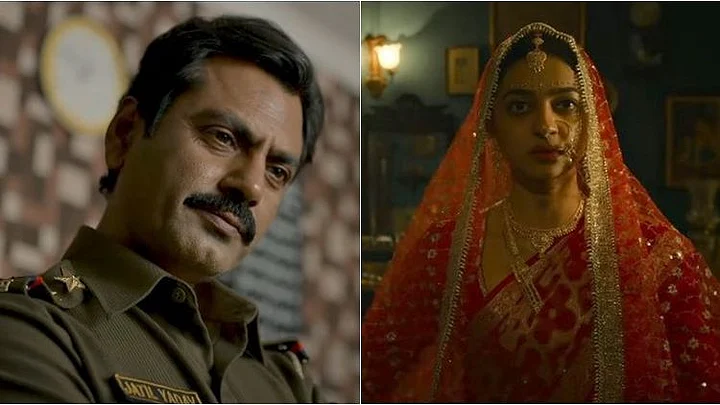‘This is a love story’, said a charmingly brilliant woman once at the start of BBC’s Fleabag Season 2 and it wouldn't be a misplacement if I reiterate that for Honey Trehan’s debut film Raat Akeli Hai.
A man named complexity solving a complex mystery and a woman carrying the centuries-old tag of abandoned lovers of her namesake, meet once and then meet again to save each other from the big bad world. Their half journeys collide on trains and track out of the world they inhabit to a retreat that makes love possible for them.
Trains play a dues ex machina in their story and it has been exploited to near perfection by the screenplay writer Smita Singh. They are the inner space of the characters' journeys towards each other. Raj Shekhar's beautiful lyrics 'adha andhera, adha savera, adha raha sab tera mera...ab roshni ki nadi mein hum tim-tim diye ki do kashtiya...adhe-adhe se hum aur baki hai' map the extent of their inner hollow but also weave a dream of completeness for them. (credit de diya yaar!)
The short lived moment of heart break and the revelation of the final truth about the lover reaffirming the lost trust, that lie at the heart of all the conventional love stories is intricately blended in the mystery of the film.
It almost falls out of sight because the audience is not here for that. To me, the magic of Raat Akeli Hai is not the loneliness of a sinister night but that of the two brilliantly conceived characters that live on the edges constantly bewildered by the lure of becoming conventional.

Radha (Radhika Apte) is a mysterious nowhere woman who is married to a blue-blooded family only to watch it rendered useless after her newly-wed husband is murdered. Jatil Yadav (Nawazuddin Siddiqui) is an 'ineligible' bachelor who slathers skin brightening cream in an attempt to become eligible and marry a sanskari woman someday only to fall for a woman who is everything he never wished 'his' woman to be. Their edges and edginess save them for each other in a very unworldly way.
What makes a good whodunnit? A gruesome murder? Unsuspecting culprit? A nerve wreaking twist? All of that, in fact. That and a charming detective who crawls his way to a hidden warm spot buried in your heart that loved a Sherlock once. Jatil is no Sherlock but he still manages to do that. He is a gutsy man of emotions who has already cast a mould for his prospective life partner. She should be decent and 'thik-thak' looking, he tells his mother. At one point he also insultingly tells Radha - teri jaisi auraton ko main apne aas-paas bhi fatkane nahi deta hoon.
He is the prototype of those old school patriarchal men who have been drawing the line of 'ghare' (home) and 'bahire' (world) for women since ages. (For a detailed discussion of this dichotomy in the context of women, read Partha Chatterjee’s brilliant essay ‘The Nationalist Resolution of the Women’s Question’)
He’s the kind of man you'd be tempted to ‘cancel’ at the very first chance. Women like Radha belong to the bahire for them and can never breach the ‘sanctum-sanctorum’ of ghare and enter.
The treatment meted out to her by the Thakur men after the murder is a reminder of how precarious her position has always been. She has loved and been betrayed and clearly knows that in a society like ours 'it takes a 'jigra' and not an ‘aukaat’ for a man to publically love and accept her.
Jatil soon realizes that he has started falling for her and in this realization the transformation occurs. The skin brightening cream finds the dustbin and the moulds cracks for he finds Radha's indomitable courage attractive and lovable. (Predictably, he has anyway imagined her as his bride within the first ten minutes of the film) The foundations of ghare and bahire are shaken at the behest of Jatil and Radha. She chooses him as much as he falls for her. Isn't it a love story?
Rittvika Singh teaches literature at University of Delhi.
(At The Quint, we question everything. Play an active role in shaping our journalism by becoming a member today.)
